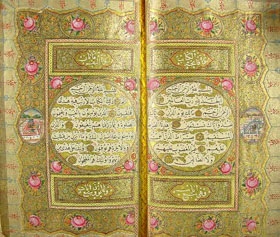There was a man named Abdullah who loved God and His Messenger so much that the Prophet had to declare about him: “Indeed, he loves God and His Messenger.” (Saheeh Al-Bukhari)
This man named Abdullah so loved the Prophet that he used to delight in presenting the Prophet with any delicacy that came to Medina, so when any merchant caravan arrived with something like butter or honey, he would take it for him as a gift. Later, when the seller demanded payment, Abdullah would bring the seller to the Prophet and say: “Give this man its price.”
The Prophet, may the mercy and blessings of God be upon him, would then say: “Didn’t you give it to me as a gift?”
Abdullah would say: “Yes, O Messenger of God; however I cannot afford to pay.”
The two of them would laugh together and then the Prophet would have the merchant paid.
This was the type of close and jovial relationship that Abdullah and the Prophet had with each other.
It remains to be said that Abdullah was an alcoholic. He would often become so drunk that he had to be brought staggering through the streets before the Prophet to be sentenced for public drunkenness, and each time, the Prophet would rule to have the prescribed punishment carried out. This was a common occurrence.
After Abdullah had departed from one of these all too frequent sentencing, one of the Companion’s declared about Abdullah: “O God curse him! How often he is summoned for this!”
The Prophet: rebuked that Companion, saying: “Do not curse him, for I swear by God, if you only knew just how very much indeed he loves God and His Messenger.” (Saheeh Al-Bukhari). He then added: “Do not help Satan against your brother.”
We can learn much from the Prophet’s attitude.
We should reflect first upon the close and affectionate relationship this Companion enjoyed with the Prophet, in spite of this Companion’s shameful fault. Though the Prophet was who he was, it did not prevent him from relating to Abdullah in a familiar manner, of being his friend, and joking with him.
This shows us that in the society formed by the Prophet, people were not segregated into the pious and the sinners, with social interactions debarred between the two groups. Rather, it was a unified, inclusive society, where each person could be at a different level of piety. Some were at the forefront of righteousness, some were moderately pious, while others were prone to fall into sin. However, no one lived aloof from society, nor was anyone shunned. Everyone remained part of society.
This inclusiveness meant that when some members of society fell into error, the effects of their mistakes were limited and short-lived. No one was marginalized, so there was no chance sinfulness to grow on society’s “fringes”. When anyone made a mistake, there was no end of brotherly support from others in society who were more than willing to lend a helping hand and get that person back on track.
Another lesson the Prophet’s conduct shows us is the importance of maintaining a positive outlook. In spite of the fact that Abdullah was frequently being summoned before the Prophet for public drunkenness, the Prophet drew everyone’s attention to one of Abd God’s positive qualities – that he loved God and His Messenger. Yet, when we think about this particular quality, we find that it was not something unique for Abdullah, but a quality that all believers have in common. Nevertheless, the Prophet chose to praise Abdullah for this reason. In doing so, the Prophet could cultivate, encourage, and strengthen this quality in everyone. He also reminded them that if someone slips up, that person’s faith and love of God is still intact.
We can imagine how Abdullah must have felt when he learned that the Prophet said this about him. He must certainly felt it as an immense honor to have God’s Messenger declare this about him. It served to help him overcome his bad habit and gave him hope, by confirming that his essential being was not permanently marred by the mistakes.
It was the Prophet’s way to point out the good qualities of those who sinned and fell into error. We sometimes forget this, and treat past sins as impenetrable barriers to future good. A person who commits a shameful deed is never allowed to live it down, but is instead often remembered only for that sin. We need to realize that this helps Satan to avail upon the sinner and get that person to sin again. The Prophet’s approach, by contrast, inspires virtue. When reminded of Abdullah’s frequent drunkenness, he boasted of that man’s possessing the greatest virtue of loving God and His Messenger.
Finally, Abdullah had done something that was clearly wrong. There can be no doubt that Abdullah committed a sin. Imbibing intoxicants is a major sin, and the Prophet had often cursed wine. Nevertheless, after the Prophet had the prescribed sentence carried out upon Abdullah for his public drunkenness, he did not seek anything further against him. He saw any further reprimand to be helping Satan against the man. Rather, he turned everyone’s attention to his merits that compensate for his shortcomings.
The Prophet’s conduct with Abdullah is an excellent example for us, full of valuable lessons regarding not only how we should treat one another, but how society can foster social bonds that are strong, wholesome, and nurturing, bonds which can serve to dissuade people from falling into sin. - islamreligion.com



 Who authored the Quran? Someone must have produced it! After all, how many desert men have stood up in the history of man and given the world a book like the Quran? The book has amazing details of past nations, prophets, and religions as well as accurate scientific information unavailable at the time. What was the source of all this? If we were to deny the divine origin of the Quran, we are left with only a few possibilities:
Who authored the Quran? Someone must have produced it! After all, how many desert men have stood up in the history of man and given the world a book like the Quran? The book has amazing details of past nations, prophets, and religions as well as accurate scientific information unavailable at the time. What was the source of all this? If we were to deny the divine origin of the Quran, we are left with only a few possibilities: Islam offers clear guidelines for all worldly matters. God did not create us and then abandon us to the cosmos. He set out all that we need to know in the Quran and followed it up with the traditions of Prophet Muhammad. God did not leave us floundering about in a sea of misconceptions and misunderstandings; Prophet Muhammad educated us and taught us that one should ask if they do not know. Of course this indicates that one should be open and truthful and never shy away from asking difficult or embarrassing questions. Thus a lot of what we understand about bedroom etiquette comes from the questions asked by the people around the Prophet, may God praise him.
Islam offers clear guidelines for all worldly matters. God did not create us and then abandon us to the cosmos. He set out all that we need to know in the Quran and followed it up with the traditions of Prophet Muhammad. God did not leave us floundering about in a sea of misconceptions and misunderstandings; Prophet Muhammad educated us and taught us that one should ask if they do not know. Of course this indicates that one should be open and truthful and never shy away from asking difficult or embarrassing questions. Thus a lot of what we understand about bedroom etiquette comes from the questions asked by the people around the Prophet, may God praise him. Islam is a holistic way of life. It takes into account all of humankind’s needs; spiritual, emotional and physical. Part of physical wellbeing includes sexual wellbeing and health. God created sex not only for procreation but to fulfil humankinds need for intimacy. Islam leaves no part of our lives unexplained and thus sexuality and intimacy are not topics that the Quran and the traditions of Prophet Muhammad, may God praise him, shy away from or neglect.
Islam is a holistic way of life. It takes into account all of humankind’s needs; spiritual, emotional and physical. Part of physical wellbeing includes sexual wellbeing and health. God created sex not only for procreation but to fulfil humankinds need for intimacy. Islam leaves no part of our lives unexplained and thus sexuality and intimacy are not topics that the Quran and the traditions of Prophet Muhammad, may God praise him, shy away from or neglect. 



 Prophet Muhammad, may the mercy and blessings of God be upon him, is the man beloved by more than 1.2 billion Muslims. He is the man who taught us patience in the face of adversity, and taught us to live in this world but seek eternal life in the hereafter. It was to Prophet Muhammad that God revealed the Quran. Along with this Book of guidance God sent Prophet Muhammad, whose behavior and high moral standards are an example to us all. Prophet Muhammad’s life was the Quran. He understood it, he loved it and he lived his life based on its standards. He taught us to recite the Quran, to live by its principles and to love it. When Muslims declare their faith in One God, they also declare their belief that Muhammad is the slave and final messenger of God.
Prophet Muhammad, may the mercy and blessings of God be upon him, is the man beloved by more than 1.2 billion Muslims. He is the man who taught us patience in the face of adversity, and taught us to live in this world but seek eternal life in the hereafter. It was to Prophet Muhammad that God revealed the Quran. Along with this Book of guidance God sent Prophet Muhammad, whose behavior and high moral standards are an example to us all. Prophet Muhammad’s life was the Quran. He understood it, he loved it and he lived his life based on its standards. He taught us to recite the Quran, to live by its principles and to love it. When Muslims declare their faith in One God, they also declare their belief that Muhammad is the slave and final messenger of God.  What topics does the Quran discuss? It covers various subjects. Most importantly, it talks about the unity of God and how to live a life which accords to His Will. Other topics include religious doctrine, creation, criminal and civil law, Judaism, Christianity, polytheism, social values, morality, history, stories of past prophets, and science.
What topics does the Quran discuss? It covers various subjects. Most importantly, it talks about the unity of God and how to live a life which accords to His Will. Other topics include religious doctrine, creation, criminal and civil law, Judaism, Christianity, polytheism, social values, morality, history, stories of past prophets, and science.